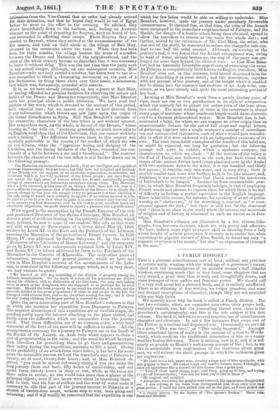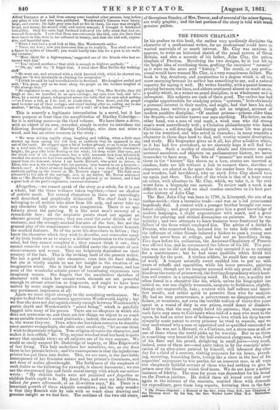A FAMILY HISTORY.* Tiffs is a pleasant miscellaneous sort of
book, without any pretence at artistic unity, winding with the windings of a governess's career, inlaid with the accumulations of an amiable woman's dull didactic wisdom, containing much that is very tame, some chapters that are very stupid, a good deal that is truly and thoughtfully drawn, and some passages of true pathos and feminine power. We should call it a very dull novel but a pleasant book, and it is entirely unaffected. There is no straining at fine writing, no vulgar grandeur, and some real distinct conceptions of character, though they are not executed with any high finish. We scarcely know why the book is called 2I Family History. The last two volumes, which are expanded into twice their proper bulk, -certainly contain one, but the connecting thread even there is the governess's autobiography, and this is the sole subject of the first volume. The book is, indeed, in several respects, one of miscellaneous
character and elements. In not a few instances Fact crops out of the Fiction in a curious and disjointed way. Occasionally we are told in a note, "This was true," or "This really happened." Amongst these occasional layers of reality is the account of a visit to Words- worth, which confirms the traditional description of him as.a canny weather-beaten dalesman. There is nothing new in it, and it is not nearly so graphic as Hazlitt's well-known account of hum; but, as we like to accumulate even confirmations of the traditions about great men, we will extract the short passage in which the authoress gives her impression : "He came in—s tall, gaunt man, wearing a huge pair of blue spectacles, with side goggles to them. He looked rough and weather-beaten, more, I thought, in outward appearance like a shrewd old dale farmer than a great poet. " ' Take off those nasty things, papa,' said Dora, going up to him, and trying to take off his spectacles ; who can see what you're like in them.
"He laughed, and complied.
"Altogether, even when the goggles were removed, his appearance disappointed: me. I saw nothing in his looks that distinguished him from other men ass great genius. I could not have picked him out as the poet, as I once picked, out.
• A Family History. By the Author of "The Queen's Pardon." Three vele. Hurst aud, Blackett.
Alfred Tennyson at a ball from among some hundred other persons, long before any print of him had ever been published. Wordsworth's features were heavy, large, and coarse; his light grey eyes had no fire in them his nose was straight, broad, and massy, his mouth wide, and rather sensual; I thought it betokened irritability. Only the calm high forehead indicated the lofty mind that had en- tranced thousands. I saw that Dora was extremely like him, only the lines that were harsh in him were in her softened to beauty, and that she had soft, expres- sive, and beautiful eyes.
"When I had had a good look at him, Mrs. Wordsworth said-
" There, my dear; now you have seen him as be really is. You shall see what a figure he makes of himself; you would hardly take him for a poet in his walk- ing costume.'
"'More likely for a highwayman,' suggested one of the friends who had re- turned with him.'
"'Yes,' echoed another—' that stick is enough to frighten anybody.'" . . . "'Oh, ay,' said he, I forgot that. I must show Miss Neville my walking- staff.'
"He went out, and returned with a thick knotted stick, which he showed me, telling me it was invaluable in climbing the mountains.'" . . . . "I think he said he had travelled twice in Scotland. His daughter smiled and said, Yes, papa, and as we went along the people on the borders laughed at "the strange mon." '
"He explained to me, who sat at his right hand, 'Yea, Miss Neville, they did laugh at me ; we travelled in an open carriage ; my eyes were bad, and so'— Dora, by a merry glance, telegraphed across the table that his eyes ailed nothing --` so I wore a veil, as I do now, to shade them. Dora drove, and the people used to come out of their cottages and stand looking after us, calling out to one another, " lo'tha, there's a mon wi' a veil! an' a lass driving!"'"
This is scarcely a leaitimate interpolation in a novel, but it has more purpose at least than the manifestation of Hartley Coleridge— for it is nothing more—in the third volume. We have there a drive, with no object of its own, recorded, simply in order to introduce the following description of Hartley Coleridge, who does not utter a word, and has no other concern in the story :
"We were driving rapidly along, laughing and talking, when a little man started up from among the tall tern, so suddenly that he appeared to rise out of the earth, lie stepped upon a bit of broken ground, so as to raise himself to a level with the carriage. His broad shoulders, and singularly diminutive height ; his grey elfin locks floating on the wind; his deep violet blue eyes, and the whole cast of his countenance, had a wild, uncannie look that irresistibly recalled the stories we had been reading the night before. See,' said, I turning round from the box-seat, where I sat beside Richard, who acted as driver, to Ellen, who was in the carriage with her parents, 'you wanted to see a brownie—
there is one!' A burst of merry laughter followed; it was checked by Richard's suddenly pulling up the horses at Mr. Trevor's angry stop!' The little man
advanced to the side of the carriage, and, to my horror, Mr. Trevor addressed him as Mr. Hartley Coleridge.' We were all quieted in an instant, and I bad a good look at the poet's expressive, careworn features."
Altogether,—we cannot speak of the story as a whole, for it is not a whole, but the three volumes taken together,—have no shadow of artistic merit. Yet several characters in them are exceedingly well described and graphically delineated. The chief fault is one belonging to all writers who draw from life only, and never take up any character fully into their own imagination. There is no uni- formity about the painting. It is like most men's memory of a remarkable face : all the emphatic points stand out against an obscure general impression ; they can recal the metre details of the costume, and the strongly-marked features of the face, but not the general play of the countenance—the common human nature beneath the marked features. So of the mere life-describers in fiction ; they know the character which they wish to describe, and remember many of its little traits so as to convey a distinct impression to the reader's mind, but they cannot complete it ; they cannot think it out; they cannot conceive how it would be modified under the pressure of new circumstances and scenes. They are helplessly dependent on their memory of the fact. This is the striking fault of the present writer. She has a good insight into character, even into its finer shades, but she is wholly unable to use her insight in the creation of an imaginative whole. She is limited by her past experience, and has none of the wonderful artistic power of transfusing experience into imaginary scenes. She forgets that the numberless sketches of character with which her mosaic-work abounds are not powerful enough to attract attention as fragments, and ought to have been united by some single imaginative frame, if they were to produce any permanent impression at all.
Again we must object strongly to the moralizing enthusiasm. We rejoice to find that the authoress appreciates Wordsworth highly ; but we fear she does not distinguish clearly enough between Wordsworth's poetic depth and Wordsworth's "moral being," which is painfully lugged into many of his poems. There are no chapters in which she does not sermonize us, and there are few things we object to so much as an amiable woman's moral platitudes ; indeed, the more amiable she is, the worse they are. Thus, when she has taken occasion to describe some austere evangelicals, she adds most needlessly, "let no one think I wish to depreciate religion. True religion elevates the character, and makes it less selfish," &c. Why, anyone who had read her book is quite aware that amiable views on all subjects are of its very essence. We could as easily suspect Dr. Doddridge of impiety, or Miss Edgeworth of fast living. This lady underlines her moralities, too, as she does those in her private letters; and the consequence is that the injudicious printer has put them into italics. This, we are sure, is the inevitable consequence of her feminine nature and her printer's literalness, and not done of malice aforethought. The feebleness of the emphasis of such italics as the following for example, is almost humorous ; we can see the compressed lips and futile moral energy with which our author wrote : "My childish faults were not punished and forgotten as childish faults ought to be. My Aunt Joan, and even my Aunt Diana, talked for years afterwards, of an ill-written copy," &c. There is a luxuriant growth of these skipable moralities; and the only wonder is that they flourish side by side with so much clear drawing and genuine insight as we find here. The outlines of the two old aunts, of Georgiana Stanley, of Mrs.Trevor, and of severalof the minor figures, are really graphic; and the last portion of the story is told with much genuine pathos.































 Previous page
Previous page